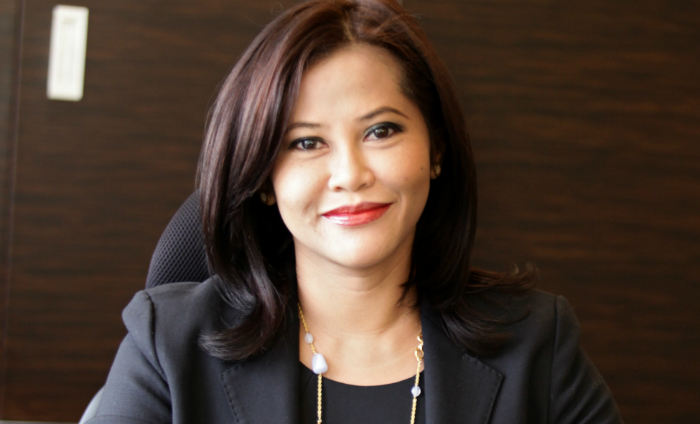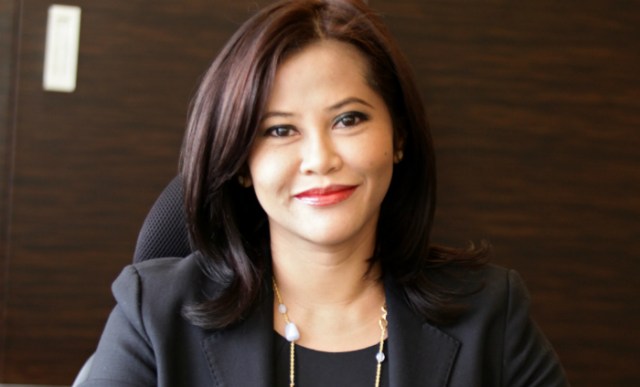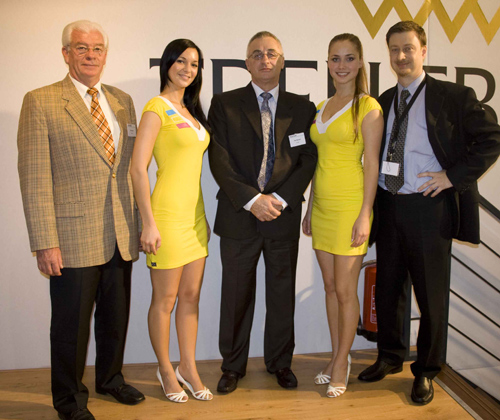
Aida Greenbury has one of the hardest jobs in the print supply chain: Taking Asia Pulp & Paper’s shattered image as the destroyer of more than two million hectares of Indonesian rainforest over the past 30 years and turning it into an environmental leader. As the managing director of sustainability for arguably the largest paper manufacturer in the world, she is the chief architect of its Forest Conservation Policy (FCP) – an ambitious position to achieve zero-deforestation in its entire supply chain – a response to years of intense pressure from NGOs and boycotts by many of its major customers, including Australia’s big three paper merchants. She is also charged with the exhausting task of selling it to the world.
Now in her eleventh year as sustainability boss, Greenbury has been with APP through almost the entirety of its decade-long war with Greenpeace that trashed its name and resulted in an exodus of big name brands. The paper giant’s strategy began with denial, lawsuits and attacks on its critics’ credibility, to a series of insufficient concessions, and finally to the realisation that only by completely abandoning deforestation as a business model could the company hope to salvage its reputation before all its customers jumped ship.
“We were fixing everything except the elephant in the room,” Greenbury says. “In the corporate world we don’t speak the NGOs’ language and what they were telling us to do was hard to swallow. What does no deforestation mean? Do you want us to go bankrupt? We were laughing at them saying ‘are you stupid?’ The one word that changed everything was ‘understanding’ – we realised the issues were real and we needed to deal with them.” She says the ball started rolling when APP saw what happened to its palm oil sister company PT Smart when it decided to stop cutting down natural forests. “We realised if they could do it so could we.”
The FCP was an ambitious undertaking. Launched last February, it includes a commitment to zero deforestation, full transparency of its operations, and severe penalties for suppliers found breaking the rules. Greenbury says the process has not just been about changing how APP operates but about changing the culture of the company. “Our communications strategy used to be about covering up, but we have learned that doesn’t work and honesty is better,” she says. “We have spent a lot of time and resources imbedding a culture of transparency across our organisation.”
The hardest part of the implementation has been policing APP’s more than 30 suppliers to ensure rainforest is not illegally or accidentally felled. It has already had one accidental breach, and Greenbury believes building capacity in the suppliers to monitor themselves is the best way to prevent another. The suppliers need to be able to make sure they are following the rules and, and if they see breaches in the policy to be able to fix it or ask for help, along with using local NGOs and independent monitoring programs. She says the monitoring system has a deterrent effect on suppliers because they know they will be cut off if they step out of line. However, Greenbury acknowledges the need for better monitoring efforts because current satellite technology can only see 500 metres of encroachment “I can park a jet in 500 metres, even a 100sqm area is a lot of forest,” she says.
Leading the charge
However, just removing deforestation from APP’s supply chain was not enough. Since its radical policy reversal, Greenbury sees the company as an environmental leader pushing for change across the industry. “While we believe in incremental change we are also committed to being a catalyst for change,” she says. “It is clear that for Indonesia to prosper, deforestation must stop and that is why we are taking a leadership role in saying no.”
Greenbury takes this leadership seriously and is calling on other companies to follow its lead and the industry as a whole, including printers and paper merchants, to examine their whole supply chain and reject any supplier that relies even slightly on deforestation. She says while many customers pulled the plug on APP after its practices were well-publicised, they continue to buy from others whose practices are yet to be exposed because they don’t have a robust policy to examine supply chains. “If the market demands that producers of any product do not destroy the rainforest, they will have no choice but to adopt the same policy as us and the forest’s survival rate will be higher,” she says. “APP is the only paper manufacturer in Indonesia with a zero-deforestation policy. We were the only ones who stuck our neck out and we need support rather than being shunned.”
Greenbury says APP cannot save the Indonesian rainforest all by itself. If other companies continue to log native rainforests, the erosion of drainage means even the best managed forest will be at risk. “We cannot operate as an island. It doesn’t matter how much forest you save here or if you have the best practice in peat land conservation, if everyone else is burning up the forest and draining the peat lands we will lose everything,” she says. “If other companies don’t support us there will be no forest left. We will fail.”
Protecting an investment
After spending so long logging millions of hectares of rainforest it is hard to believe that the only motivation for APP’s dramatic, and some might say a bit rich, call to arms is the environment – surely not being able to log natural forest will put it at a competitive disadvantage that it would like to remove. The FCP has been a massively expensive undertaking, costing ‘many, many times more’ than the $1500-2000 a hectare it takes to knock down a forest and replace it with plantations.
Greenbury admits as APP is a business this plays into its decision making, but that as one of the biggest paper manufacturers in the world it can afford to operate with higher costs while the market catches up. The company is more concerned with protecting its considerable plantation and conservation investments. “If we don’t level the playing field and other companies still do whatever they want, they will destroy our investment,” she says. “We need to make sure our investment is sustainable and will bring in a return on investment to us in the long term, and the only way to do that is if everyone else is doing the same.
“We don’t see it as a cost, we see it as an investment. If we don’t invest in conservation of the peat land, the plantation might only survive 10 or 20 years and we want to use it forever,” she says. “We didn’t make the FCP just for PR or the environment, we need to do this to keep our business alive and be sustainable and stronger into the future.”
In fact, Greenbury argues it is in the interests of other companies to follow APP’s policy because then the standards and certifications can be simplified. “For example, there is no standard for high carbon stock, so if we work with stakeholders to finalise and simplify a standard, instead of spending $1m on high carbon stock protection, it might only cost them $20, because it is easy to follow,” she says.
Forestry tradition
Greenbury seems genuinely sincere in her desire to save the rainforest, regardless of the commercial imperatives APP now faces and the many years she spent firing back at Greenpeace’s well-targeted salvos. There is a tireless passion and determination in her voice, and almost a pleading to be believed as genuine and not just another corporate greenwasher.
She was raised in a forestry family, daughter of a highly respected forestry expert Achmad Sumitro, dean of the forestry faculty at Gadjah Mada University for 20 years and the first person granted a forestry economics professorship by the Indonesian President. She went on to study wood science engineering at Gadjah Mada University in Yogyakarta in 1988-94, helping her father with his work in her spare time. While a student she travelled extensively around Europe to study the forestry industry from a global perspective. After graduating she worked for Indonesia’s biggest plywood company before being recruited by APP in 2004.
Winning hearts and minds
Greenbury is proud of her achievements on the FCP so far. Customers are returning, with Australia’s second biggest paper merchant BJ Ball sticking with the company through hard times. “BJ Ball is one of our key partners in Australia and has been nothing but supportive through the implementation of this policy and we need more companies to stand up and support us,” she says. Greenbury says many customers, including some big brands, have been coming back since about six months after the FCP began and others are in different phases of returning – doing trial runs, waiting for independent reports, or waiting for Forest Stewardship Council certification. The majority of the customers APP that were lost are at least talking.
The NGOs, too, have laid down their arms and are actively collaborating with APP to implement the FCP as effectively as possible. Greenpeace has come on board as a ‘constructive partner’ and has ‘moved its campaign from the streets to the boardroom’. “Even husband and wife bicker every now and then, of course we argue sometimes about how to get things implemented and how to communicate things,” she says. “What we are trying to do is not easy, it’s bloody hard trying to incorporate the input of so many different stakeholders who have different priorities. It took us many months to build trust with Greenpeace and we trust them to bring issues to us rather than on the streets.”
WWF has been harder to win over, long citing the FCP’s lack of provision for the restoration of the forest it claims it has destroyed. APP largely quelled those concerns last month, announcing plans to restore and conserve one million hectares of rainforest and establish an independently administered trust fund to manage and finance the conservation measures. Greenbury says it has become clear that the key to success of any efforts to halt deforestation in Indonesia is a landscape level approach to forest restoration and conservation. “Land cannot be conserved or restored in isolation, the sustainability of the entire landscape must be taken into account and many stakeholders must be involved,” she says. WWF feels the move has ‘substantially strengthened’ the FCP and that it looks forward to working with APP on the project.
Regaining legitimacy
APP is now slowly working its way towards the coveted FSC certification it not only lost, but became one of only two companies ever to be formally disassociated by the organisation. An audit by a nine-member team from NGO Rainforest Alliance, led by internationally recognised Canadian forester Keith Moore, into the FCP implementation is underway on the ground in Indonesia with a report due in September. This audit is widely viewed as a crucial step in APP’s path to regain legitimacy and its FSC certification.
While Greenbury seems sure its results will be positive, she concedes it is important nothing goes wrong. “In a country where rainforest encroachment and illegal logging are rampant, anything could go wrong and we knew that from the beginning,” she says. “What’s most important about the audit is to get the facts out there. We might do the wrong thing, but what is the system that we put in place going to do to fix it?” Greenbury refers to the audit as an ‘additional layer of scrutiny and assurance’ to improve transparency and useful for the company to know for itself how it’s doing and help improve the policy. “I don’t think anyone in the industry is as transparent as us currently,” she says. “It is a very important step but the most important is getting the policy implemented on the ground. My focus is to get people to understand and support us and verified information will help with that.
Greenbury also called out customers, like KW Doggett and Spicers, that are waiting for the results of the audit or for FSC certification before considering doing business with APP again, saying they are ‘stuck’ on labels and daring them to instead come to Indonesia and see for themselves. “Customers need to get away from this focus on labels and look for themselves into what their suppliers are doing,” she says. “Labelling is not good enough, you have to be stricter – how many times do you hear about a certified brand being caught illegally harvesting in Africa? We’re not the only one that was engaged in deforestation in Indonesia, we are just one that got caught. Companies have to get deeper into the issues and look for themselves.”
If anyone is going to convince the fence sitters it will be Aida Greenbury, but it seems the Australian printing industry will be paying close attention in September all the same.
Comment below to have your say on this story.
If you have a news story or tip-off, get in touch at editorial@sprinter.com.au.
Sign up to the Sprinter newsletter


